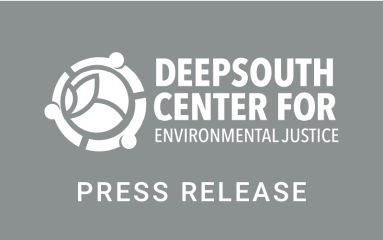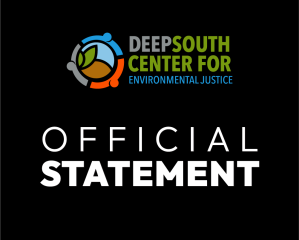Sign up to get email updates and join our online community of supporters.
DSCEJ requires disclosure of any actual or perceived conflict of interest.

NATIONAL (February 29, 2024) - Today leaders within the environmental justice movement responded to the U.S. Environmental Protection Agency's plan to tackle emissions from existing gas plants in a supplemental rulemaking to the “New Source Performance Standards for Greenhouse Gas Emissions from New, Modified, and Reconstructed Fossil Fuel–Fired Electric Generating Units (EGU); Emissions Guidelines for Greenhouse Gas Emissions From Existing Fossil Fuel–Fired Electric Generating Units.” “We are pleased to learn that EPA Administrator Michael Regan and the White House are responding to our individual and collective concerns about the treatment of existing gas plants in the current iteration of its carbon rule proposal. Our organizations have repeatedly sounded an alarm about the lack of environmental justice analysis and cumulative impacts considerations in the proposal, and we see this reconsideration as an important step for allowing a more thoughtful and comprehensive plan for regulating this critical segment of the power sector. We strongly believe that climate pollution mitigation and environmental justice for communities go hand in hand. Any rulemaking to address the existing gas sector can and must achieve significant reductions in greenhouse gasses while also improving local air quality and the public health of overburdened communities. In addition, a supplemental rulemaking for existing gas plants opens up the possibility of considering a diverse range of policy and practice options, from multiple sources within the Federal family, to improve pollution mitigation and environmental justice outcomes and to respond to the climate crisis. Our request is that the EPA have a clear timeline and transparent process for proposing and implementing a supplemental rulemaking for existing gas plants as we are prepared to work collaboratively with the Agency on this new phase.” Signatories: Peggy Shepard, Co-Founder and Executive Director, WE ACT for Environmental Justice. Dr. Ana Baptista, Co-Director of the Tishman Environment & Design Center at The New School and Associate Professor at The New School University. Dr. Nicky Sheats, Ph.D, MPP, Esq., Director, Center for the Urban Environment at the John S. Watson Institute for Urban Policy and Research at Kean University. Dr. Beverly Wright, Founder and Executive Director, Deep South Center for Environmental Justice Dr. Robert D. Bullard, Distinguished Professor of Urban Planning and Environmental Policy and Director of the Bullard Center for Environmental and Climate Justice at Texas Southern University Rev. Lennox Yearwood, Jr., President and CEO, Hip Hop Caucus Maria Lopez-Nuñez, Deputy Director, Organizing and Advocacy, Ironbound Community Corporation Melissa Miles, Executive Director, New Jersey Environmental Justice Alliance Dr. Beverly Wright, Founder and Executive Director of the Deep South Center for Environmental Justice stated, “We are grateful to have EPA’s leadership to reduce power plant pollution in a way that is protective of nearby communities. Power plants are disproportionately located near Black and other communities of color, and release massive amounts of pollution that cause asthma and contribute to climate change. Allowing these existing plants to employ carbon capture and storage or hydrogen co-firing would increase health risks and set back progress on renewable energy. We look forward to participating in regulations for existing power plants that advance environmental and climate justice.” Peggy Shepard, Co-Founder and Executive Director of WE ACT for Environmental Justice stated, “We are pleased to see that the voices and considerations of environmental justice communities are being factored into this monumentally impactful area of environmental rulemaking. The EPA has a responsibility to our communities and to our future - the power sector is one of the top sources of carbon emissions and pollution - we have a limited amount of time to not only create an energy transition but also to do it the right way with clean and renewable sources and communities in mind. With this pause to take a deeper dive into developing the most comprehensive and thoughtful rulemaking for existing gas plants, we have an opportunity to do this work correctly and effectively to protect the human and environmental health of the most overburdened, neglected, and vulnerable people across the country - which in turn benefits everyone. We are wholly appreciative of the EPA’s leadership in demonstrating the need for further review, and at the same time request a clear and transparent process as we look forward to collaborating for its improved realization. Only when this rule is finalized can we truly know we are on a path to resilience and justice. Our movement being recognized and included in the EPA’s process will indeed create a world in which we don’t have to dare to breathe, but instead live and breathe more easily today and tomorrow.” Dr. Ana Baptista, Co-Director of the Tishman Environment & Design Center at The New School and Associate Professor at The New School University shared, "US EPA’s decision to address existing natural gas plants in a supplemental rulemaking process is a critical opportunity to take up the substantive environmental justice concerns voiced by communities in the comment period. A large majority of natural gas plants contribute to the existing, disproportionate burdens already faced by environmental justice communities. This decision allows for a more comprehensive approach to tackling both climate change and the cumulative impacts that these plants pose to overburdened communities." Dr. Nicky Sheats, Ph.D, MPP, Esq., Director, Center for the Urban Environment at the John S. Watson Institute for Urban Policy and Research at Kean University shared, “In addition to fighting climate change, climate change mitigation policy should be used to improve the health of communities by improving local air quality. Re-considering the portion of the power plants rule that applies to existing natural gas plants will provide EPA with more opportunity to ensure that overburdened environmental justice communities are not sacrificed as the nation fights climate change. We need to make sure the rule does, in fact, improve local air quality in these communities and does not make it worse.” Dr. Robert D. Bullard, Distinguished Professor of Urban Planning and Environmental Policy and Director of the Bullard Center for Environmental and Climate Justice at Texas Southern University stated, "We applaud EPA for taking an important step toward mitigating pollution from the fossil fuel power generation sector, and we implore the agency to go further down this path. Curtailing pollution is of the utmost urgency as communities of color and low-wealth struggle under the weight of historical and continued pollution and injustice. We call on the EPA to continue enacting anti-racist policies that result in real justice for real people. We don’t need any false solutions like hydrogen and carbon capture that will add to the pollution burden that already exists in our communities. Instead, we need only those solutions that improve environmental conditions for the most vulnerable people." Rev. Lennox Yearwood, Jr., President and CEO, Hip Hop Caucus shared, "The rule as proposed did not address the concerns of environmental justice communities. Therefore, it is encouraging to see the EPA and Biden Administration pause to reflect on environmental justice needs rather than push out regulations that do not address the climate crisis, as it is a racial justice matter. We look forward to continuing to engage on this existing gas plant rule and others to ensure community concerns are uplifted and harmful impacts are addressed.” Maria Lopez-Nuñez, Deputy Director, Organizing and Advocacy, Ironbound Community Corporation shared, "Environmental Justice communities can breathe a little bit easier with this delay in the release of the ‘New Source Performance Standards for Greenhouse Gas Emissions from New, Modified, and Reconstructed Fossil Fuel–Fired Electric Generating Units (EGU); Emissions Guidelines for Greenhouse Gas Emissions From Existing Fossil Fuel–Fired Electric Generating Units.’ We are hopeful that this delay will allow a reconsideration that fully embraces Environmental Justice in order to ensure healthy outcomes for our communities." Melissa Miles, Executive Director, New Jersey Environmental Justice Alliance stated, “Delaying the existing natural gas plants part of the power plants rule will give EPA a better opportunity to make sure the rule helps environmental justice communities in their fight to improve local air quality. There needs to be protections in the rule to ensure that environmental justice communities already overburdened by air pollution are not further burdened by this rule.” MEDIA CONTACTS: Ashley Sullivan, WE ACT for Environmental Justice, ashley.sullivan@weact.org Angelica Salazar, Tishman Environment & Design Center at The New School, salazara@newschool.edu Maria Lopez-Nuñez, Ironbound Community Corporation, 201-978-6660 Dr. Beverly Wright, Deep South Center for Environmental Justice, beverlyw@dscej.org Joseph Pate, Hip Hop Caucus, joseph@hiphopcaucus.org Nicky Sheats, Center for the Urban Environment at the John S. Watson Institute for Urban Policy and Research at Kean University, 609-558-4987 Dr. Robert D. Bullard, Bullard Center for Environmental and Climate Justice at Texas Southern University, drrobertbullard@gmail.com Melissa Miles, New Jersey Environmental Justice Alliance, melissa@njeja.org ### ...

Dr. Beverly Wright to Gov. Jeff Landry: "Meet with us and learn about our achievements and challenges in Louisiana." The Honorable Jeff Landry Governor, State of Louisiana Office of the Governor PO Box 94004 Baton Rouge, LA 70804 Dear Governor Landry: It has come to my attention that, as Louisiana State Attorney General, you filed a Freedom of Information Act request for communications between the Deep South Center for Environmental Justice and the US Environmental Protection Agency. Please know that you should feel free to contact me for this information. As the founder and executive director of the Center, I can share with you the work we do to make Louisiana a better place for families and future generations to live, work, and thrive. The Center provides opportunities for communities, scientific researchers, and decision-makers to collaborate on projects that promote the rights of all people to be free from environmental harm as it impacts health, jobs, housing, education, and quality of life. Our work is centered on education, research, community and student engagement, as well as health and safety training for environmental careers. We strive every day to build the capacities of community-based organizations to advance environmental justice and equitable climate solutions. I invite you to meet with us and learn about the achievements we have made and the challenges we experience in Louisiana. Sincerely, Beverly Wright, PhD Founder and Executive Director ...

From the Desk of Dr. Beverly Wright: The Path Forward with EPA and Carbon Capture and Storage (CCS) Yesterday, the EPA granted Louisiana the authority to create underground carbon capture wells following the state’s application. DSCEJ and the entire environmental justice movement have fought carbon capture and storage every step of the way and this recent news does not end our fight against this unproven and dangerous technology. CCS is one of the biggest threats to communities of color being harmed by the polluting industries that exacerbate our climate crisis and by the regulatory agencies that are supposed to be protecting them. We have had an ongoing dialogue with the EPA and state officials about CCS and have voiced our opposition at every opportunity, including at a public hearing this past June and during Administrator Regan’s visits to Louisiana over the last 3 years. While this decision is not what we tirelessly advocated for, or is in the best interest of Cancer Alley communities, our next steps all center around accountability for EPA and Louisiana officials. The EPA’s Memorandum of Agreement with the State of Louisiana includes environmental justice provisions requiring the state act to protect communities from current or future environmental hazards associated with CCS. The inclusion of these environmental justice provisions is encouraging and must be enforced and referenced at every step of the process. With a history of unjust environmental policies, we proceed cautiously. Communities across Louisiana are depending on these provisions to protect them from decades of environmental policy that put these very communities at risk from illness, pollution, and death. Louisiana’s most vulnerable cannot be left exposed to an untested pollution control technology without accountability. I look forward to working with each of these communities to make sure state and federal officials hold up their end of the bargain. While our frustration with the overall decision is unwavering, we want to keep the dialogue ongoing and harness our frustration into measures of accountability. We will be sharing more information in the new year about our next steps and actions. Thank you for continuing to be part of this important work and not relenting in the ongoing fight against CCS. Dr. Beverly Wright ...